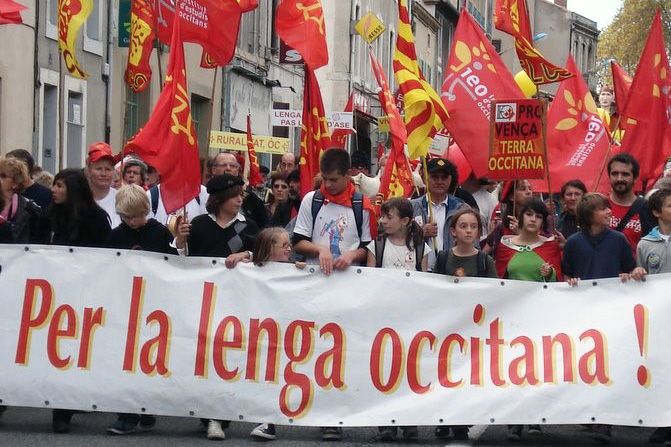The Human Right to Speak Whatever Language You Want is Worth Celebrating
With an ever increasing lack of language diversity, There Needs to Be More Recognition of February’s International Mother Language day
/https://tf-cmsv2-smithsonianmag-media.s3.amazonaws.com/filer/fa/54/fa54cb13-13de-4650-8895-d1ca325f3c06/42-56111467web.jpg)
In a calendar packed with commemorative and awareness days, I’m sorry to report that no parades, concerts or speeches are planned here in the United States for February 21, International Mother Language Day. The day to celebrate this bond was chosen by the United Nations in 1999 to commemorate four students who were shot and killed in 1952 by Pakistani police for protesting the right to use their own language, Bengali.
This bond between individuals and their languages, one that if broken is not forgotten for generations, the UN recognizes as a human right. As a linguist and a language educator, I beg you to get out the kazoos and plan a parade.
Language is what makes us human. With very few exceptions—severe brain trauma—no matter our station in life, our intelligence or our society's ability to create sophisticated gadgets, we all use a highly complex communication system to explain our basic needs or to describe our wildest dreams. The phrase “mother language,” which we once described as “mother tongue,” refers to what we are taught at home from birth by our mothers—our first language or native language.
Languages are severely endangered and risk being lost in our lifetime. Some languages haven't been heard for as many as 100 years while some disappeared a few years ago. There may be only a few elderly people who remember the words and hearing conversations in an endangered language. But we know from hard-earned examples of the Myaamia language of the Miami Tribe, and the Manx language on the Isle of Man, that dedicated individuals and families, and then communities, can bring back silent languages. That is how strong the language bond can be.
Nearly 96 percent of languages are spoken by less than 4 percent of the population. Losing language diversity—there have been as many as 7,000 languages in the world—is timely and urgent. If we keep losing languages at the rate we are today, we may have fewer than 1,000 languages left to speak of (Linguists love puns!). Yes, humans create new languages, but not nearly at the rate we are losing them today. Surely, this affects us all in ways that we don't even know yet.

In many areas of the world, households are not just bilingual, but multilingual. A child's mother may speak to them in more than one language, and certainly these children grow up hearing from infancy multiple languages from their extended families. Multilingual people feel equally comfortable in all of these languages, although from an early age they figure out who is more comfortable in which language, and in what situation, and adapt effortlessly. For them, declaring a first language is rather like asking which color you saw first. The choice is most often made on the father's town's language, or the one that they feel most familiar with, or which is politically safer. Even in the U.S., often defined as a monolingual society, 55 million English-speaking Americans use another language in the home. For this reason, the day should also recognize multilingualism and more properly be called International Mother Languages Day. In modern and traditional societies alike, children are often raised by grandparents, fathers, siblings, aunties, even two mothers. So to be inclusive, the day could also be called International Primary Caretakers Languages Day. Despite the term's deficiencies, mother language does capture the bond that we have with the languages we learned to speak from those we love. The bond between humans and language, this is what the day is about.
Celebrating language is like getting to celebrate your birthday (uniqueness) and a new year (every culture recognizes this passage whether it is lunar-based, harvest-based or historically-based) at the same time. We can celebrate the diversity of human expression and creativeness in what makes up our nearly 7,000 languages on earth, and we can celebrate this bond that as humans we all share.
So how should we celebrate something as intangible as language? Well, I don't expect a kazoo parade just yet, but why not talk to your neighbor about his or her language as a start? Say something like: "I hear you speaking a really cool language. What is it?" Or, ask your colleagues at work how to greet them in their language. Choctaw Halito! or Ethiopian Amharic Teanaste'lle'n or Welsh Bore da! The day goes a long way to accepting each other more completely as neighbors in this world.
The February 21-24, 2018 Mother Tongue Film Festival hosted by the Smithsonian Recovering Voices Program of the National Museum of Natural History, the Center for Folklife and Cultural Heritage and the National Museum of the American Indian celebrates the United Nations International Mother Languages Day with feature and short films about Indigenous and endangered languages.
/https://tf-cmsv2-smithsonianmag-media.s3.amazonaws.com/accounts/headshot/mary-linn22.jpg)